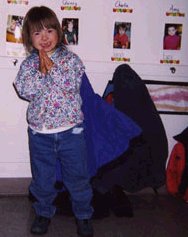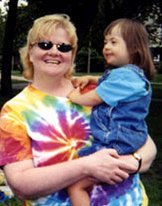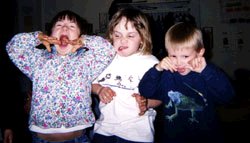Iowa Alumni Magazine, June 2004
|
Riverbend DS Assocation Home Page » New Parent Packet » Parent to Parent » Fathers' Perspectives »
Moving Beyond Stereotypes
Moving Beyond Stereotypes |
|
Bradley Bane Iowa Alumni Magazine, June 2004 |
Reprinted by permission of Iowa Alumni Magazine |
At our regular restaurant, the waitress pulls my daughter aside and ties her hair back in a ponytail, all the while making clucking noises at me, her incompetent father. At the grocery store, the checkout clerk comes out from behind the counter to give Quincy a hug and then lets her help bag groceries. Whether it is someone going out of the way to be especially nice to her, or some stranger (to me, at least) passing Quincy on the street outside our Chicago home and greeting her by name, I always think the same thing—how lucky I am to have a daughter who has made such an impression on others. And, of course, by extension, how great a father I must be. Though, in retrospect, few people greet me by name, and no one lets me help bag the groceries.
Why is my daughter so memorable? Part of it is her good looks, the twinkling of her eyes while she's making a joke, the force of her personality. Part of it is her unique view of the world, whether walking around the room telling people they are her friends, or riding around in the car after dark telling me she wants to "touch the purple night." Part of it is that she has Down syndrome.
 |
| Quincy on the last day of preschool in 2003 |
What's most interesting to me is how often I forget that she even has a disability, something I would have found inconceivable when she was born five years ago.
Seven months into her pregnancy, my wife and I found out that our first child was going to be born with Down syndrome. Upon hearing the news, my feelings about parenthood changed, my thoughts focusing on all the things our child would never be able to do. After Quincy was born, I obsessed over her, trying to identify which of her traits were most closely associated with Down syndrome versus those that would be seen in a typically developing child—as if I were hoping for the impossibility that she had a mild case. This notion seems ridiculous now, but that was my situation then. It took a long time before I was able to see only my child, as opposed to my child with Down syndrome. I pray that this evolution was not apparent to her.
Medically speaking, instead of two number 21 chromosomes, Quincy has three—a condition known as Trisomy 21. This condition affects the first cell when the mother's egg is fertilized, so that each dividing cell carries the same abnormality. On a practical level, Down syndrome results in low muscle tone, a high prevalence of certain identifying physical characteristics, an increased risk of some medical conditions, particularly heart problems, and what would commonly be considered mild to moderate mental retardation. Affecting one in about 750 births, Down syndrome is the most common chromosomal abnormality. Not that it ever feels particularly common.
From the books I read and the people I encountered when Quincy was born, I had the misconception that all children with Down syndrome are very similar. I've learned from experience, though, that none of these children is a stereotype, Quincy included. Yes, she can be exceedingly charming; yes, I do feel God gave me a gift when she was born (but no more nor less so than when our son was born three years later); yes, she can be an angel, to the extent that all young children are sometimes angelic. But there are also days when she thinks her name is "No, stop, go to your room," and I realize why some species of animals eat their young.
Not surprisingly, Quincy is a complex individual, full of contradictions. She could identify letters and words at 18 months, did not learn to walk until she was three, and is not yet toilet trained. Until recently, her primary means of communication was sign language. Quincy is incredibly patient with adults she knows, often repeating the same phrase five or six times until the adult can understand her; with other children, though, she becomes frustrated and acts out because they cannot decipher her code the way an attentive adult can, or she cannot produce the words she wants quickly enough to hold their attention. Advanced. Delayed. Patient. Frustrated. At times, I've almost given up trying to explain her to people. If I can keep their minds open to her limitless possibilities, then perhaps that is enough. Or, if I'm really lucky, I run into people who keep my mind open.
If anyone has been as committed to Quincy and her continued progress as my wife and I have been, it is Quincy's preschool teachers. When we enrolled her in the toddler program at her preschool, we were beset by doubts as to whether Quincy would thrive. At the time, she was almost completely nonverbal and did not yet walk. I think if the roles had been reversed and I had been a preschool teacher, I'd have thought I was dealing with parents who were—and I'm not sure this is the correct medical term—nuts! The toddler program worked well, though, and Quincy was able to participate in all activities, owing a great deal to one-on-one adult intervention and the fact that two-year-olds aren't very independent anyway.
 |
| Quincy with her preschool teacher, Debbie Mytich, at an end-of-year 2001 party |
With her third birthday rapidly approaching, however, we had to decide whether to place Quincy in an inclusive setting with typically developing children or in a special education classroom, knowing it might be difficult to change our minds later. While children with Down syndrome have a strong ability to learn, it does take longer, and we felt Quincy would need her full allotment of preschool time to get ready for kindergarten.
My wife and I decided that a special education classroom was not the best choice at that time, leaving us with two viable options. One was a structured type of learning program that has typically been successful for children with disabilities. That school had children with Down syndrome already enrolled and fully included, and teachers there had even taken the extra step of bringing in a consultant to help them. Then there was the program we chose, just because it felt right. This preschool, where Quincy had attended the toddler program, was much less structured, the type of program to which I would have wanted to send my daughter if she did not have a disability. No child with Down syndrome had yet attended the school, and, since it's not a public school, no law required it to accept Quincy. Yet, the staff there still agreed to take her. Perhaps I should say they embraced her, as that would be a more appropriate description of their admission process.
As a reward, the teachers were repaid with torture. Befallen by horrible separation anxieties, Quincy cried for a week straight, and no amount of teacher or parental intervention could staunch the flow of tears until they had run their course. Not unusual, the teachers assured us, although I couldn't help but wonder if this would be the tipping point, the thing that would cause them to reevaluate their acceptance of Quincy.
They didn't even blink. They just worked with us to come up with a solution, as they have with every problem we've encountered during the past two years, none of which has been unusually severe but each of which has made me wonder if it would be the proverbial straw.
Quincy is completely included in every aspect of the school day, even when it isn't the easiest thing to do. That's not to say that she necessarily has the same mastery of all activities as do all the other children, though she often does. It is to say that she's an integral part of her class, with rapidly growing skills and an ever-increasing sense of belonging through the friendships she's made. Her teachers realized something even before I did, something supported by research but maybe not intuitively obvious: All children benefit from the inclusion of children with disabilities, not just those with the disability.
Superimposed on top of preschool has been a continuous regimen of therapy and special education services, all designed to aid Quincy in participating fully in preschool, in all future educational endeavors, and in life. Much like with her preschool, the public school from which she receives these services has really accepted Quincy. People want her to be there. At some level, I think that's been the most important thing. It's not about always knowing how to handle Quincy—as parents, we certainly don't have all the answers, so I'm not sure how we could expect that of others—but about always wanting her.
 |
| Quincy being silly with preschool friends, Charlie (center) and Brian in 2003 |
If this all sounds like a lot of work, that's because it is—a little bit for us as parents, a lot for Quincy. We ask things of children with disabilities we would never ask of a typically developing child. Quincy has been subjected to an average of three hours of therapy a week since she was a year old. She's been asked to contend with my ever-shifting expectations and the pressures those place on her. To make matters worse, through it all I expect Quincy to serve as a poster child for Down syndrome, always being on her best behavior as she may be a person's only exposure to the condition. I want people to see a child with Down syndrome who is well-behaved, polite, and smart (which she is)—not a five-year-old who occasionally acts up (which she does).
It is hard being Quincy. Most children can get by being average, and that's enough. Quincy, though, has to be at her best every day to achieve something even approximating "average" for a typically developing child. It makes me tired, the constant struggle and self-doubt. But I try hard, too, and I hope that will prove to be enough.
A vernacular of clichés dances around having a child with a disability, and mainly I try to avoid it. If I ask others to move beyond stereotypes and expectations in regards to Quincy, then I must move beyond clichés when trying to explain her and the complexity of my feelings toward her, too. Mostly, I'm not philosophical about my daughter. I just enjoy her presence in my life and that is enough, because it is truly my privilege to know her. Having Down syndrome makes it harder for my daughter to learn and easier for her to reach out and touch the lives of others, and I have to accept that. Most days, that's not such a bad trade to make.
Bradley Bane, 89BBA, who lives in Chicago and works in marketing research, is an award winner in Iowa Alumni Magazine's 2003 nonfiction writing competition. He says that he learns more from his daughter Quincy than she learns from him.